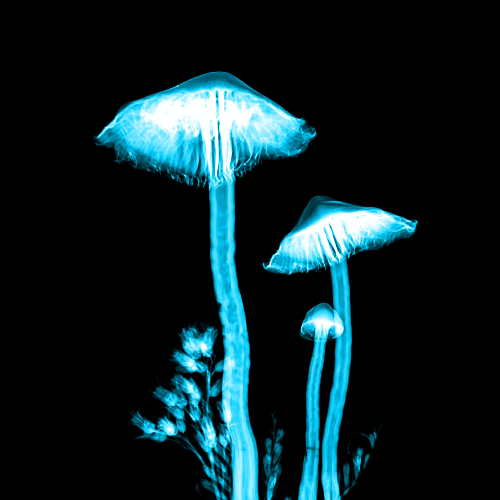Monographs licensed from Therapeutic Research Center, LLC
Scientific names: Psilocybin
Alternate names: 3-[2-(Dimethylamino)ethyl]-1H-indol-4-yl] Dihydrogen Phosphate, O-Phosphoryl-4-Hydroxy-N, N-Dimethyltryptamine, Psilocibin, Psilocybine, Psilocin Phosphate Ester
Actions: General, Anti-addiction, Anti-migraine, Neurological
Scientific names: Psilocybin
Alternate names: 3-[2-(Dimethylamino)ethyl]-1H-indol-4-yl] Dihydrogen Phosphate, O-Phosphoryl-4-Hydroxy-N, N-Dimethyltryptamine, Psilocibin, Psilocybine, Psilocin Phosphate Ester
Actions: General, Anti-addiction, Anti-migraine, Neurological
Psilocybin is a psychedelic compound found in "magic mushrooms", often in the Psilocybe genus. It's used in spiritual rituals, recreationally, and as medicine.
Psilocybin has hallucinogenic effects. It can be obtained from both fresh and dried mushrooms in varying concentrations. It can also be created in a lab. There's increased interest in using pure psilocybin for addictions, depression, and other mental and psychological disorders due to its potential to stimulate certain areas of the brain.
People use psilocybin for alcohol use disorder and other addictions, anxiety, depression, migraines, PTSD, and many other conditions, but there is no good scientific evidence to support these uses.
Psilocybin is illegal under federal law in the US. It is classified as a Schedule I controlled substance.
When taken by mouth: Psilocybin is possibly safe when used as a single dose under medical supervision. Single doses of psilocybin have been used in controlled settings without serious side effects. The most common side effects include confusion, fear, hallucinations, headache, high blood pressure, nausea, and paranoia. Despite being a controlled substance in the US, the risk for abuse seems low. Withdrawal symptoms and physical dependence don't appear to be a major concern.
There isn't enough reliable information to know if psilocybin is safe to use without medical supervision at any dose, including micro doses.
Special Precautions & Warnings:
Pregnancy and breast-feeding: There isn't enough reliable information to know if psilocybin is safe to use when pregnant or breast-feeding. Stay on the safe side and avoid use.
Bipolar disorder: Psilocybin might increase the risk of mania in people with bipolar disorder or those with a family history of bipolar disorder.
Heart disease: Psilocybin might increase the risk of cardiac arrest and death in people with heart disease.
Irritable bowel syndrome (IBS): Psilocybin might make diarrhea worse in people with IBS.
There is interest in using psilocybin for a number of purposes, but there isn't enough reliable information to say whether it might be helpful.
Psilocybin has most often been used by adults in single doses of 0.2-0.42 mg/kg by mouth as part of a medically supervised, drug-assisted psychotherapy program. Some people also use psilocybin in "micro doses", but there isn't enough reliable information to know what an appropriate dose might be.
Psilocybin is illegal under federal law in the US. It is classified as a Schedule I controlled substance.
Interactions with pharmaceuticals
Serotonergic Drugs
Interaction Rating=Moderate Be cautious with this combination.
Psilocybin might increase a brain chemical called serotonin. Some medications also have this effect. Taking psilocybin along with these medications might increase serotonin too much. This might cause serious side effects including heart problems, seizures, and vomiting.
Stimulant Drugs
Interaction Rating=Moderate Be cautious with this combination.
Stimulants, such as amphetamines and cocaine, speed up the nervous system. By speeding up the nervous system, stimulant medications can increase blood pressure and speed up the heartbeat. Psilocybin might also speed up the nervous system. Taking psilocybin along with stimulant drugs might cause serious problems including increased heart rate and high blood pressure.
Interactions with herbs & supplements
Herbs and supplements with serotonergic properties: Psilocybin increases a brain chemical called serotonin. Taking it along with other supplements that have this effect might cause serious side effects, including heart problems, seizures, and vomiting. Examples of supplements with this effect include 5-HTP, black seed, L-tryptophan, SAMe, and St. John's wort.
There are no known interactions with foods.
vital.ly has licensed monographs from TRC Healthcare.
This monograph was last reviewed on 08/03/2024 11:00:00. Monographs are reviewed and/or updated multiple times per month and at least once per year.
Natural Medicines disclaims any responsibility related to medical consequences of using any medical product. Effort is made to ensure that the information contained in this monograph is accurate at the time it was published. Consumers and medical professionals who consult this monograph are cautioned that any medical or product related decision is the sole responsibility of the consumer and/or the health care professional. A legal License Agreement sets limitations on downloading, storing, or printing content from this Database. No reproduction of this monograph or any content from this Database is permitted without written permission from the publisher. It is unlawful to download, store, or distribute content from this site.
Natural Medicines rates safety based on scientific evidence according to the following scale: Likely Safe, Possibly Safe, Possibly Unsafe, Likely Unsafe, Unsafe, and Insufficient Evidence to Rate. For more information about Natural Medicines’ Safety Rating System,
click here.
The Natural Medicines Effectiveness Ratings are assigned for specific indications. A product might be rated "Possibly Effective" for one condition, but be rated "Likely Ineffective" for another condition, depending on the evidence. For more info
click here.





